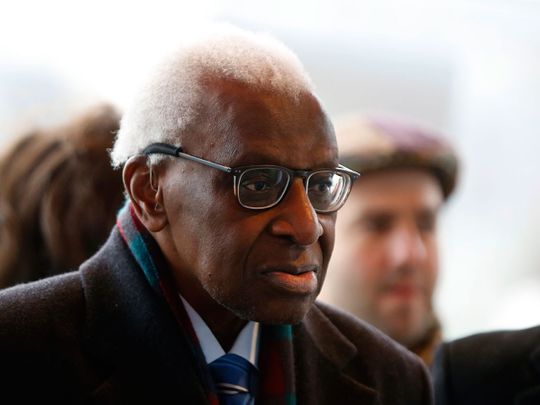
Dubai: Disgraced former world athletics head Lamine Diack returned has home to Senegal after a local football club paid a bond of just over $600,000 to allow him to leave France.
Diack, the president of world athletics from 1999-2015, was convicted in Paris in September on multiple charges of corruption during his tenure, some of it related to the Russian doping scandal. He was sentenced to four years in prison, with two of those years suspended.
But French justice authorities said Diack, who is 87, was unlikely to spend any time in jail because of his age. He had been under house arrest in France since 2015. The bond is related to a separate case against him.
Simon Ndiaye, a lawyer for Diack, said he was allowed to leave France after posting bail in a case involving alleged bribery in the build-up to the vote for the host city for the 2016 Olympics.
Diack was handed preliminary charges in that case and his passport was confiscated, but a French judge lifted the ban on him leaving the country on condition he pay 500,000 euros and continue to answer court summons, Ndiaye said.
“He was relieved, moved and happy to be able to return to his country and his family,” Ndiaye said. “But it remains a legal case that affects him. He finds it unfair. He continues to deny wrongdoing in both cases.”
Diack appeared frail as he walked through the airport after arriving in Dakar. He wore a smart blue suit but used a walking stick and was helped by a family member. He did not make any comments.
The bond money was raised by a football club in Senegal that Diack once led, according to Ndiaye and an official with the club. Youssou Dial, vice president in charge of finance at Jaraaf de Dakar, said the club raised the money by selling off some of its properties. Diack was president of Jaraaf in the 1970s and in the late 1990s and 2000s.
His conviction in France last year marked a spectacular fall from grace for a man who was head of World Athletics, then known as the IAAF, for nearly two decades and was an influential figure in the world of Olympic sports.
Diack was found guilty of being part of a scheme that squeezed 3.2 million euros in bribes out of Russian athletes suspected of doping. The hush money allowed the athletes, who should have been suspended, to keep competing. Diack was also found guilty on breach of trust charges but acquitted of money laundering.
His son, Papa Massata Diack, who worked as an IAAF marketing consultant, was also convicted and was sentenced to five years in jail in his absence. The judge said $15 million was funnelled to the younger Diack’s companies from various contracts negotiated by the IAAF while his father was in charge.
Papa Massata Diack lives in Senegal, which refused to extradite him to France for the trial. Both Diacks have appealed their convictions.
Four others were found guilty on charges related to corruption or receiving bribes in the scandal. They were former IAAF treasurer Valentin Balakhnichev, former IAAF doping official Gabriel Dolle, former IAAF lawyer Habib Cisse, and Russian coach Alexei Melnikov.








